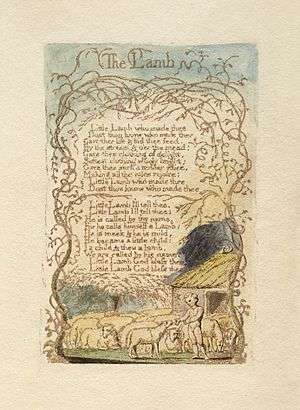The Lamb (poem)
"The Lamb" is a poem by William Blake, published in Songs of Innocence in 1789.

"The Lamb" is the counterpart poem to Blake's poem: "The Tyger" in Songs of Experience. Blake wrote Songs of Innocence as a contrary to the Songs of Experience – a central tenet in his philosophy and a central theme in his work.[1] Like many of Blake's works, the poem is about Christianity. The lamb is a common metaphor for Jesus Christ, who is also called "The Lamb of God" in John 1:29.
This poem written in rhyming couplets, although the rhyme "lamb"/"name" is only approximate by modern standards. The first and last couplet in each stanza exhibit identical rhyme, as for example the first: "Little Lamb who made thee / Dost thou know who made thee". In the first stanza, the speaker asks the lamb who his creator is; the answer lies at the end of the poem. Here we find a physical description of the lamb, seen as a pure and gentle creature. In the second stanza, the lamb is compared with the infant Jesus, as well as between the lamb and the speaker's soul. In the last two lines, the speaker identifies the creator: God.
Like the other Songs of Innocence and Songs of Experience, The Lamb may have been intended to be sung, but no records survive of Blake's own musical settings.[2] It was set to music by Vaughan Williams in his 1958 song cycle Ten Blake Songs, although he described it as "that horrible little lamb – a poem that I hate".[3] It was also given a setting by Sir John Tavener, who explained: "The Lamb came to me fully grown and was written in an afternoon and dedicated to my nephew Simon for his 3rd birthday." American poet Allen Ginsberg set the poem to music, along with several other of Blake's poems, in 1969 and was included on his album Songs of Innocence and Experience by William Blake.[4] Ginsbeg's songs were re-worked by Steven Taylor for the album Songs of Innocence & of Experience: Shewing The Two Contrary States Of The Human Soul, released in 2019, by Ace Records, to coincide with the Blake exhibition at Tate Britain.[5][6]
Gallery
 Songs of Innocence copy B 1789 Library of Congress object 29 "The Lamb"
Songs of Innocence copy B 1789 Library of Congress object 29 "The Lamb" Songs of Innocence, copy G, 1789 (Yale Center for British Art) object 8 "The Lamb"
Songs of Innocence, copy G, 1789 (Yale Center for British Art) object 8 "The Lamb" Songs of Innocence copy U 1789 The Houghton Library object 11 "The Lamb"
Songs of Innocence copy U 1789 The Houghton Library object 11 "The Lamb"%2C_object_8_The_Lamb.jpg) Songs of Innocence and of Experience, copy A, 1795 (British Museum), object 8 "The Lamb"
Songs of Innocence and of Experience, copy A, 1795 (British Museum), object 8 "The Lamb"%2C_object_8_The_Lamb.jpg) Songs of Innocence and of Experience, copy C, 1789, 1794 (Library of Congress), object 8 "The Lamb"
Songs of Innocence and of Experience, copy C, 1789, 1794 (Library of Congress), object 8 "The Lamb"%2C_object_8_(The_Lamb).jpg) Songs of Innocence and of Experience, copy Y, 1825 (Metropolitan Museum of Art), object 8 "The Lamb"
Songs of Innocence and of Experience, copy Y, 1825 (Metropolitan Museum of Art), object 8 "The Lamb" Songs of Innocence and of Experience, copy Z, 1826 (Library of Congress) object 8 "The Lamb"
Songs of Innocence and of Experience, copy Z, 1826 (Library of Congress) object 8 "The Lamb"%2C_object_8_The_Lamb.jpg) Songs of Innocence and of Experience, copy AA, 1826 (The Fitzwilliam Museum), object 8 "The Lamb"
Songs of Innocence and of Experience, copy AA, 1826 (The Fitzwilliam Museum), object 8 "The Lamb"
References
- Kazin, Alfred. "Introduction". The Portable Blake. The Viking Portable Library. 41–43.
- Haggarty, Sarah; Mee, Jon (2013). William Blake - Songs of Innocence and of Experience. Macmillan International. p. 48. ISBN 978-0-23022-010-2.
- Hold, Trevor (2005). Parry to Finzi: Twenty English Song-Composers. Boydell Press. p. 122. ISBN 9781843831747.
- "Songs of Innocence and Experience by William Blake, tuned by Allen Ginsberg".
- "Steven Taylor's Blake". January 4, 2020.
- Records, Ace. "Songs of Innocence & of Experience: Shewing The Two Contrary States Of The Human Soul". Ace Records.
External links
| Wikimedia Commons has media related to Songs of Innocence - The Lamb. |
| Wikisource has original text related to this article: |
- A Bibliography of Important Interpretations of "The Lamb" from the University of Georgia English Department